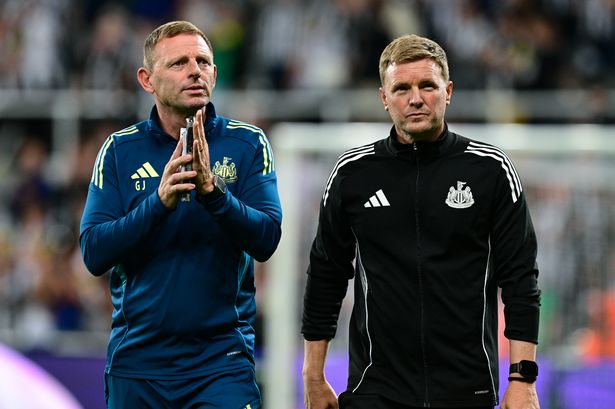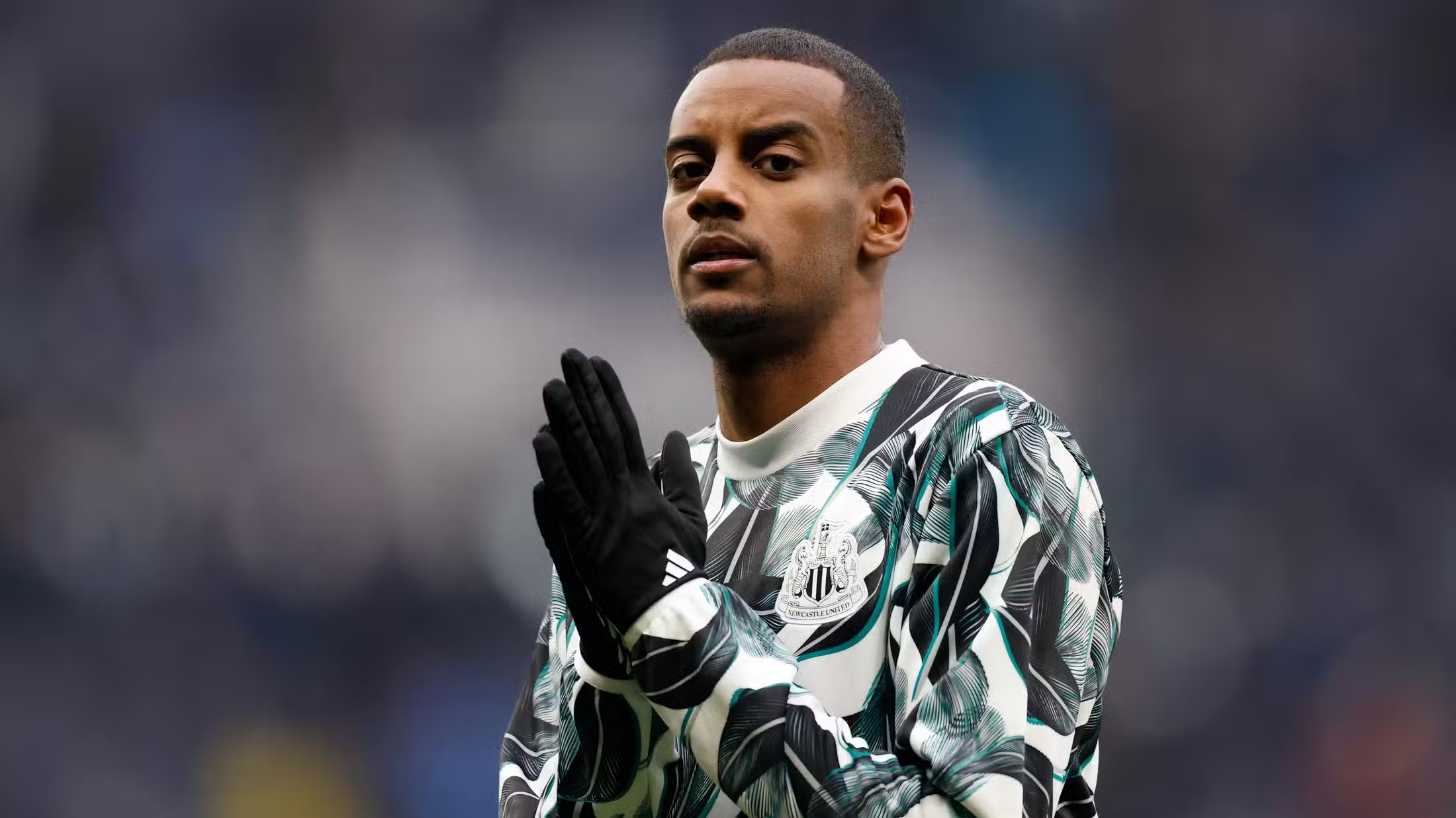The transfer window always brings with it the drama, speculation, and intrigue that keeps football fans glued to their screens. For Newcastle United, who have quickly evolved from perennial underdogs into one of the Premier League’s most ambitious projects under Eddie Howe, this summer carries particularly high stakes. The Magpies are in dire need of attacking reinforcements, but a key debate is now emerging: should Howe and his recruitment team rely on a £40 million-rated in-house striker alternative, or push the envelope to bring in a fresh face?
At first glance, the option seems tempting. The player in question — already on Newcastle’s books and considered a £40m talent by club insiders — offers the kind of raw potential that could save the club tens of millions in the market. Yet the notion of leaning on him as the solution to Newcastle’s striker dilemma comes with caveats, risks, and questions that could ultimately define the club’s trajectory for the coming season.
This article dives deep into Newcastle’s ongoing striker conundrum, Eddie Howe’s tactical demands, and why, despite the appeal of an in-house solution, the Magpies may need to think twice before staking their Champions League ambitions on an unproven gamble.
The Context: Newcastle’s Striker Problem
For all the progress Newcastle United have made in recent seasons, one glaring issue continues to haunt them — striker depth.
Alexander Isak, the marquee signing from Real Sociedad in 2022, has blossomed into one of the Premier League’s most technically gifted forwards. His blend of pace, intelligence, and finishing makes him a nightmare for defenders. Yet, even the most ardent Magpies supporter knows that Isak cannot shoulder the entire load. His injury record, while not disastrous, has raised eyebrows. Last season, he missed over a dozen games, and Newcastle’s attack stuttered in his absence.
Callum Wilson, a talismanic presence when fit, has also struggled to maintain consistent availability. At 33 years old, Wilson’s body is showing the wear and tear of years of high-level football. Howe trusts him, but even he knows that relying on Wilson as a full-season option is wishful thinking.
With a Champions League qualification fight looming, domestic cup competitions, and the ever-grueling Premier League schedule, Newcastle simply cannot afford to gamble on just two strikers who are prone to spells on the treatment table. The need for depth is clear. The question is how to achieve it.
The £40m Alternative: A Risky Internal Solution
Behind the scenes, whispers around St James’ Park suggest that Eddie Howe already has a £40m-rated striker alternative at his disposal. While club officials have not named names in public, insiders point to Newcastle’s investment in developing younger attacking options — players like Yankuba Minteh, who impressed on loan, or the possibility of repositioning wide talents such as Anthony Gordon or Joelinton in more central attacking roles.
Some analysts have even speculated that Howe could use this summer to promote Minteh into a more prominent position, rather than spending big in the market. Minteh, just 20 years old, has shown flashes of brilliance with blistering pace, dribbling ability, and confidence in front of goal. In a market where talented young forwards routinely fetch £40m or more, Newcastle’s valuation of him is not far-fetched.
From a purely financial standpoint, the case is strong: why spend £40m on a new striker when you already have one developing in-house?
But football, especially at Newcastle’s current stage of growth, is rarely that straightforward.
The Case for the Alternative
On the surface, the idea of relying on an internal solution carries several benefits:
- Financial Prudence
With Financial Fair Play regulations looming large, Newcastle cannot spend recklessly. Using an existing player as a solution avoids a major transfer outlay and allows funds to be invested in other critical areas, such as midfield depth or defensive reinforcements. - Continuity and Familiarity
A player already embedded in the club’s culture and training routines requires less adaptation. Eddie Howe values cohesion and dressing room harmony, and a familiar face stepping into a bigger role could maintain balance within the squad. - Long-Term Potential
If a young player like Minteh fulfills his potential, Newcastle could be sitting on a homegrown star who provides not only goals but also resale value in the future. Betting on youth has its rewards if the player blossoms. - Versatility in Attack
Howe has often rotated his forwards, preferring attackers who can press, drop deep, and contribute to the build-up. An adaptable internal option might allow him to experiment tactically without the pressure of accommodating an expensive new signing.
The Risks That Newcastle Cannot Ignore
While the appeal is undeniable, Newcastle must consider the flip side — and it’s here that the argument to think twice becomes compelling.
- Unproven at the Top Level
A £40m valuation means little without performances to back it up. Players like Minteh may have potential, but untested forwards often struggle under the intense pressure of the Premier League. For a club chasing Champions League football, gambling on potential could derail momentum. - Injury Domino Effect
Should Isak or Wilson suffer long-term injuries, the weight of expectation would fall on the alternative option. Is it realistic to expect a young or inexperienced forward to carry Newcastle’s attack through crunch fixtures against Manchester City, Liverpool, or in Europe? - Fan Expectations
Newcastle supporters have embraced the club’s new ambition. After watching rivals splash out on marquee forwards, fans may be less forgiving if the club refuses to dip into the market and instead “makes do” with an untested solution. A failed gamble could damage trust between the board and the fanbase. - Opportunity Cost
Every transfer window offers a chance to strengthen. By refusing to sign a striker now, Newcastle risks missing out on targets who may not be available later. Should their internal alternative fail to develop as hoped, the club may find itself back at square one next summer — but with even fewer options.
Eddie Howe’s Tactical Demands
Central to this debate is Howe’s tactical system. Newcastle’s success has been built on high-intensity pressing, dynamic wing play, and fluid attacking movements. Strikers in his setup must not only score goals but also:
- Press defenders relentlessly
- Link midfield and attack seamlessly
- Create space for runners like Gordon and Almirón
- Contribute defensively during transitions
Isak excels at this; Wilson has the nous to adapt. But can the £40m-rated alternative — whether it’s Minteh stepping up or another makeshift forward — meet these demands consistently? Howe is not a manager who tolerates passengers in his system.
This raises the question: is it fair, or even wise, to thrust such tactical responsibility onto an inexperienced forward?
The Market Reality
The striker market is notoriously unforgiving. Proven goal scorers command astronomical fees, often upwards of £50–70m. For Newcastle, who must navigate FFP carefully, finding value is essential.
This reality makes the £40m alternative seem appealing, yet Newcastle also know that sometimes the market dictates ambition. Rivals like Tottenham, Chelsea, and even Aston Villa are actively pursuing forwards. If Newcastle stand still, they risk being overtaken in the race for European places.
Howe’s team cannot afford a season of regression. Even a slight drop in goal output could spell the difference between Champions League qualification and Europa League football.
Fan Perspectives: A Divided Tyneside
Speak to Newcastle fans, and you’ll hear a mix of excitement and anxiety about the striker debate.
- Optimists argue that investing faith in a young alternative could pay off spectacularly. After all, Newcastle have a proud history of giving opportunities to emerging talents who blossomed into stars. They see this as a chance to build sustainably rather than throwing money at every problem.
- Skeptics, however, warn that the stakes are simply too high. Champions League football is not guaranteed every season, and missing out now could stall the project’s momentum. They argue that Newcastle should seize the moment and secure a proven forward, even if it comes at a premium.
Social media is rife with debates, highlight reels of potential alternatives, and pleas for marquee signings. The divide underscores the pressure facing the board this summer.
Comparisons with Rivals
To put Newcastle’s dilemma in perspective, consider their rivals:
- Tottenham signed Richarlison as an alternative to Harry Kane — a move that, while initially criticized, has paid dividends.
- Manchester United splashed on Rasmus Højlund, betting on potential, and the jury is still out.
- Arsenal invested heavily in Gabriel Jesus but have relied on squad rotation with Eddie Nketiah.
Each case highlights the gamble inherent in striker recruitment. Newcastle must decide whether they want to follow the path of prudence or ambition.
Financial Fair Play and Long-Term Planning
FFP looms large in all of Newcastle’s decisions. The club’s revenues have grown, but not yet to the level of Manchester City or Manchester United. Every £40m spent must be justified.
An in-house solution reduces spending pressure, freeing funds for midfield creativity or defensive upgrades. Yet this short-term saving could cost more in the long term if results falter and Champions League revenue slips away.
The club’s ownership group faces a balancing act: sustainability versus ambition. The striker decision embodies this tension perfectly.
Why Newcastle Should Think Twice
After weighing the pros and cons, the conclusion emerges clearly: Newcastle should think twice before relying solely on the £40m striker alternative.
Yes, the financial savings are tempting. Yes, the potential is exciting. But the risks — unproven ability, pressure, injuries, and missed opportunities — outweigh the benefits at this stage of Newcastle’s project.
Eddie Howe’s side has reached a critical juncture. They are no longer outsiders punching above their weight; they are contenders expected to deliver. To gamble on an untested forward now could undo years of progress.
Instead, the smart play may be to sign a proven striker this summer, while still nurturing the £40m alternative behind the scenes. This dual approach offers both security and long-term growth, ensuring Newcastle have depth, competition, and sustainability.
Conclusion: The Defining Decision of the Summer
For Newcastle United, the striker debate is more than just a transfer dilemma — it is a symbol of the club’s identity and ambition.
Do they lean into financial prudence, banking on potential and patience? Or do they seize the moment, investing heavily to cement their status among the elite?
Eddie Howe already has a £40m striker alternative at his disposal. But the evidence suggests Newcastle should think twice before betting the house on it. In a league as unforgiving as the Premier League, where rivals are strengthening aggressively, the cost of hesitation could be greater than the cost of ambition.
As the summer window unfolds, all eyes will be on St James’ Park. For the Magpies, this decision may well shape not just the season ahead, but the trajectory of the entire project.




